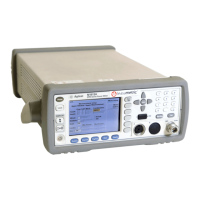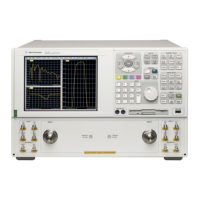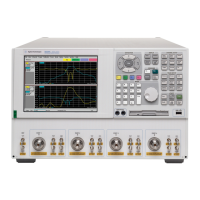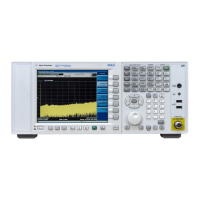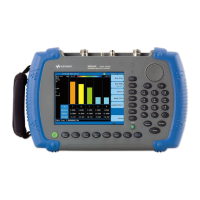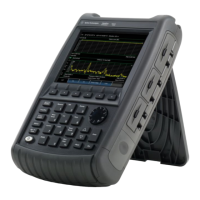Chapter 3 223
Mode
Distance To Fault
Mode
Freq Range
Sets the Frequency Range to be specified manually by you, or to be set automatically. If
you select Auto, the Start and the Stop Frequencies will be determined by your Start
Distance and Stop Distance settings.
Automatic Frequency Range. You select the measurement distance and the spectrum
analyzer automatically selects the Start Frequency and the Stop Frequency. This
measurement distance is set using the
Start Distance and Stop Distance menu keys on the
Freq/Dist/Calibrate menu. In this mode, the displayed and measured distances are the
same. There are 256 measurement points across the distance you set. This approach
provides the maximum measurement resolution across the selected distance. The
disadvantage is that the start and stop frequencies are automatically set and may limit the
spectrum analyzer's ability to sweep through filters or lightning protectors. This mode is
best used for checking a cable that has no frequency limiting devices.
Example 1: If you set
Start Distance to 0 m (0 ft.). and the to 60 m (197 ft.), and you
specify 256 Data Points, the instrument automatically selects a
Start Freq of 10 MHz
and a
Stop Freq of 303.23 MHz.
Example 2: If you again set
Start Distance to 0 m (0 ft.). and the Stop Distance to 60 m
(197 ft.), and but this time you specify 1024 Data Points to give you greater resolution,
the instrument automatically selects a
Start Freq of 10 MHz and a Stop Freq of
1.183 GHz.
NOTE For more detail on how the frequency range affects the Distance to
Fault measurement, see “Measured Distance - the Effects of Frequency
and Points” on page 230.
Manual Frequency Range. When set to Manual, you must specify the Start Frequency and
the Stop Frequency, and the measured distance is worked out from these frequencies.
Generally, the typical start and stop frequencies you use will result in a measured distance
that will be larger than the distance over which you want to look for faults.
The Measured Distance and the Displayed Distance can be different. The distance over
which the instrument has made its measurements, and which has been derived from the
frequencies you specified, is called the Measured Distance. This is displayed at the top
right corner of the measurement screen.
The Displayed Distance refers to that part of the entire Measured Distance that you
choose to display on your measurement screen. You set the Displayed Distance manually
by pressing the
Start Distance and the Stop Distance menu keys on the Freq/Dist/Calibrate
Mode Stimulus / Response
Range Man | Auto | 1 | 0
Key Path
FREQ/Channel, Freq Range
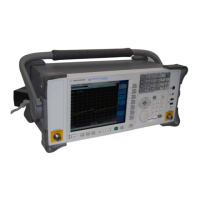
